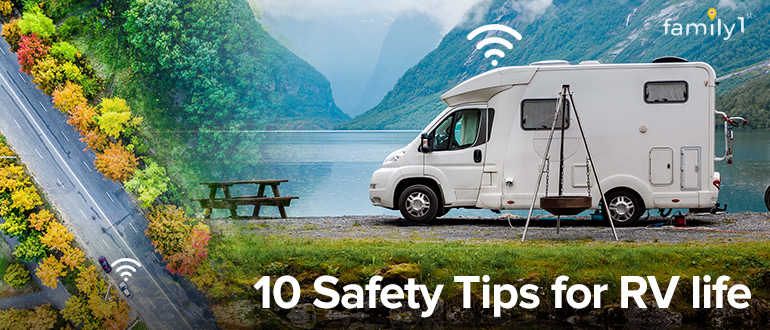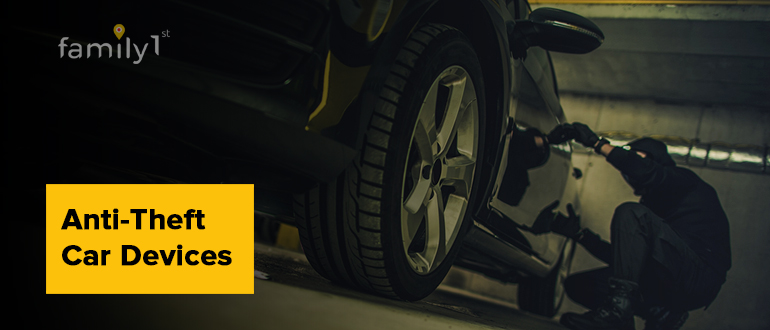Key Takeaways:
- Plan your RV trip carefully by researching routes, checking weather conditions, and packing essential safety gear to prevent unexpected challenges.
- Inspect your RV before every trip by checking tires, brakes, fluid levels, and securing all items to avoid mechanical failures and accidents.
- Drive cautiously and stay updated on weather conditions, road restrictions, and RV weight limits to ensure safe and smooth travel.
- Stay prepared for emergencies and security risks by using a GPS tracker, securing your RV from theft, having proper insurance, and keeping a backup plan for unexpected situations.
Table of Contents
What are the safety tips for RV life?
1. Plan Your Trip Thoroughly
A well-planned trip minimizes risks and ensures you are prepared for potential challenges. Before hitting the road:
- Research your route and destination – Know the road conditions, traffic regulations, and available amenities at your destination.
- Check weather forecasts – Storms, extreme winds, and heavy rain can make RV travel dangerous. Stay updated on weather conditions for both your route and camping locations.
- Pack essential safety gear – Fire extinguishers, first-aid kits, spare tires, a tire pressure monitor, a flashlight, and a GPS tracker are must-haves.
- Prepare an emergency plan – Have a backup campsite and an alternative travel route in case of road closures or weather disruptions.
2. Conduct a Pre-Trip Safety Inspection
Before each journey, conduct a thorough inspection to prevent mechanical failures. Key areas to check include:
- Tire condition and pressure – Underinflated or overinflated tires can lead to blowouts. Inspect all tires, including the spare.
- Fluid levels – Check engine oil, transmission fluid, coolant, and brake fluid.
- Brake and lighting system – Ensure your brakes respond properly, and all exterior lights are working.
- Safety equipment – Test smoke detectors, carbon monoxide alarms, and fire extinguishers.
- Secure all interior and exterior items – Loose objects can shift while driving, causing damage or injury.
Skipping these checks can result in avoidable breakdowns and costly repairs.
3. Monitor Tire Health to Prevent Blowouts
One of the most common causes of RV accidents is tire failure. To keep your tires in top condition:
- Check inflation pressure regularly, especially before long trips.
- Replace any tire older than five years, even if it appears to be in good shape.
- Avoid overloading your RV, as excessive weight can strain the tires.
- Protect your tires when parked by using covers to shield them from sun exposure and prevent dry rot.
A tire pressure monitoring system (TPMS) can help you detect early signs of tire issues before they turn into major problems.
4. Drive with Caution and Adjust for RV Weight
RVs are heavier and require more stopping distance than standard vehicles. Safe driving practices include:
- Increase following distance – Sudden braking is more challenging in an RV.
- Use turn signals well in advance – Signal at least 50 feet before turning or merging.
- Be cautious of low clearances – Always check height restrictions for tunnels, bridges, and overhangs.
- Reduce speed in strong winds – RVs have a higher center of gravity, making them more susceptible to tipping in crosswinds.
A GPS navigation system specifically designed for RVs can help you avoid roads with height, weight, or turning restrictions.
5. Stay Informed About Weather Conditions
Weather can significantly impact RV travel. Stay prepared by:
- Checking real-time weather updates before and during your trip.
- Avoiding areas prone to flash floods and selecting campsites with good drainage.
- Being cautious in high winds, as RVs can be difficult to control in strong gusts.
- Monitoring wildfire activity, especially in dry regions.
Having a weather radio or a mobile weather app can provide real-time alerts and help you make informed decisions.
6. Learn Basic Troubleshooting and Repairs
Knowing how to handle minor RV issues can save you time and money. Basic troubleshooting skills should include:
- Fixing electrical problems – Understanding your RV’s power system can help you reset breakers or troubleshoot a faulty outlet.
- Handling water system issues – Knowing how to repair minor leaks or replace water filters can prevent major inconveniences.
- Checking and replacing fuses – A blown fuse can affect lights, appliances, or charging outlets.
Carrying a set of essential tools, such as a wrench set, screwdrivers, a multimeter, and duct tape, can be invaluable on the road.
7. Ensure You Can Call for Help in an Emergency
Many RV adventures take you through remote areas with little to no cell service. To ensure you can get help when needed:
- Invest in a GPS tracker that allows you to send emergency alerts.
- Keep a satellite communication device for areas without cellular coverage.
- Let someone know your itinerary and estimated arrival times.
Being prepared for communication failures ensures that you can receive assistance quickly when necessary.
8. Protect Yourself and Your RV from Theft
Theft can happen anywhere, whether at a campground, parking lot, or rest stop. Secure your RV by:
- Locking doors and windows whenever you step away.
- Installing motion-sensor lights to deter intruders.
- Using a GPS tracker to monitor your RV’s location and receive alerts in case of unauthorized movement.
- Keeping valuables out of sight to avoid attracting potential thieves.
Campgrounds and public parking areas are generally safe, but it’s always best to remain vigilant.
9. Have Proper RV Insurance and Roadside Assistance
Standard auto insurance may not cover all RV-related incidents. Before setting off, ensure:
- Your policy includes RV-specific coverage, including liability, collision, and theft.
- You have roadside assistance that specializes in RVs, as towing a large vehicle can be costly.
- You are aware of weight regulations, as exceeding them may void insurance claims.
Keeping insurance and roadside assistance details readily available ensures quick access to help when needed.
10. Always Have a Backup Plan
Unpredictable events such as road closures, campground issues, or mechanical failures can disrupt your trip. Having a contingency plan helps you stay in control. Consider:
- Mapping alternative routes in case of detours.
- Identifying backup camping spots before arrival.
- Keeping extra supplies such as food, water, and fuel in case of extended delays.
- Knowing where the nearest repair shops and hospitals are located in case of emergencies.
Flexibility and preparation allow you to adapt without unnecessary stress.
Conclusion
RV life offers adventure and freedom, but safety must always come first. By planning ahead, maintaining your vehicle, and staying prepared for emergencies, you can avoid common risks and enjoy stress-free travel.
Using tools like GPS trackers, weather alerts, and roadside assistance ensures you stay connected and protected on the road. With the right precautions, your RV journey can be both exciting and secure, allowing you to explore with confidence.










Next
Previous